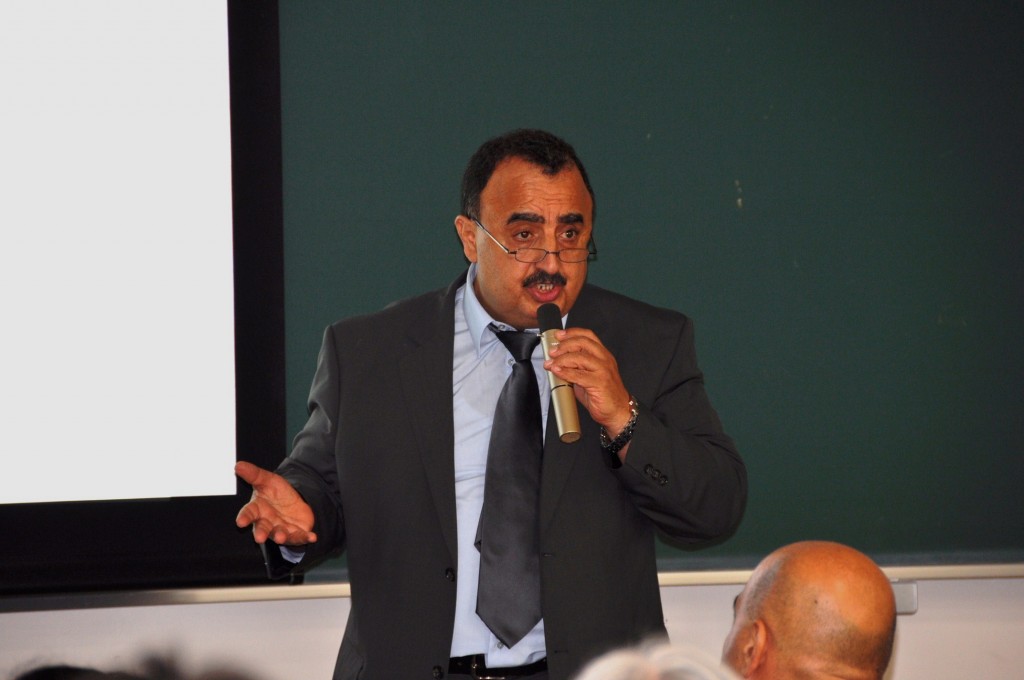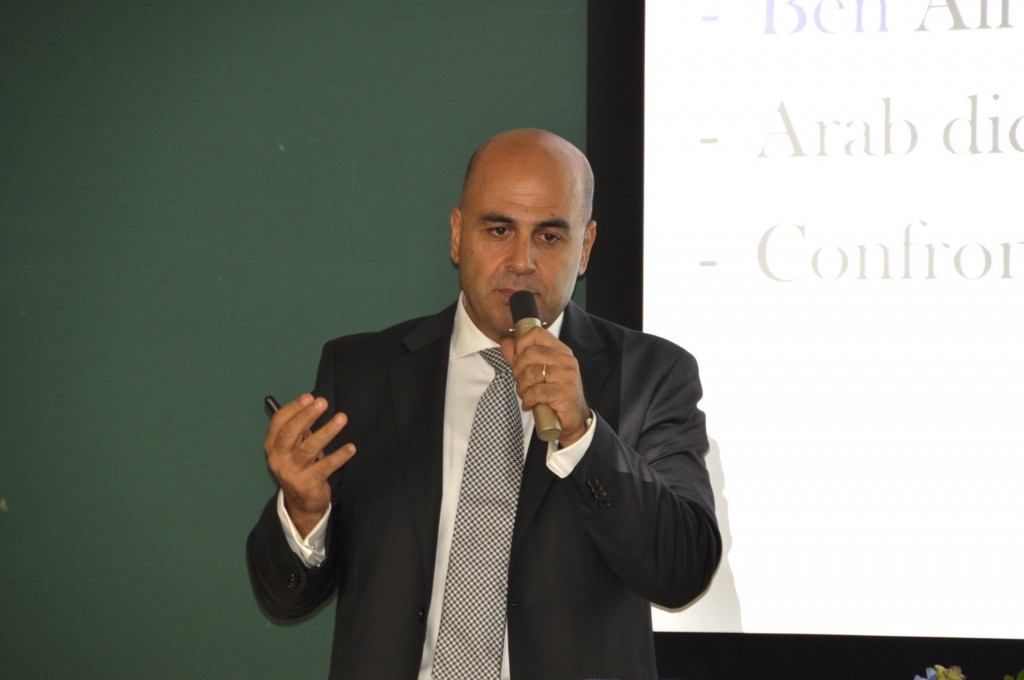Center for Interdisciplinary Study of Monotheistic Religions(CISMOR)Doshisha University
> Public Lectures > Arab Media and the Conflicts in the Middle East: A View from the AL ARABIA TVPublic Lectures
Open Lecture by Project1
Arab Media and the Conflicts in the Middle East: A View from the AL ARABIA TV
| Date: |
2011/06/29 17:00 − 19:00 |
|---|---|
| Place: | Room S3, Shisei-kan 1F, Imadegawa Campus, Doshisha University |
| Lecture: |
Antoine AOUN, Program Editor of News and Current Affairs, Al Arabiya News Channel Naji AL HARAZI, Senior Writer/ Reporter/ Translator in the News and Current affairs Department, Al Arabiya news channel |
| Summary: | |
|
How did local media report and respond to the political upheavals in the Middle East that occurred in succession, beginning from the so-called “Jasmine Revolution” of Tunisia? This question was discussed by Mr. Antoine Aoun, Program Editor of News and Current Affairs, Al Arabiya News Channel, and by Mr. Naji Al Harazi, Senior Writer/reporter/translator of News and Current Affairs, Al Arabiya News Channel, both of whom visited Japan at the invitation of the Sasakawa Middle East Islam Fund of the Sasakawa Peace Foundation. A member of the MBC Group, Al Arabiya News Channel is a television news channel based in Dubai (United Arab Emirates), and it has been dedicated to offering news programs around-the-clock since its establishment in 2003. First, Mr. Aoun discussed the overall situation of the Middle East, centering on Tunisia and Egypt. According to him, the Arabic countries with dictatorial regimes had long maintained strange mutually dependent relationships with Israel, as Arabic dictators could use the threat of Israel as a pretext for not promoting the process of domestic democratization This was also the case for Ben Ali, the former president of Tunisia. The mass media of these Arabic countries were placed under the strict control of the governments and were not able to directly criticize domestic governmental policies, while they openly pointed fingers at the Israeli government when reporting the “Israel problem.” (The mass media of Israel, as well, have exaggerated the terror of Arab dictators by way of justifying the occupation of Palestine by Israel.) Recently, however, drastic changes were brought about in the situations surrounding “politics and media” in the Arabic region, driven by three events. The first is the participation of Osama Bin Laden in the “political game” of the Middle East. In addition to directing harsh criticism toward Western countries, Osama Bin Laden blamed Arabic leaders for suppressing the general public and acting as the puppets of Israel. By doing so, he succeeded in garnering broad support from young Arabs (Muslims). The second is the military interventions by the U.S. in the Middle East following the 9/11 attacks, especially the impacts of the Iraqi War. Though its people did not play a leading role in ending the dictatorship of Iraq, they watched with their own eyes through news reports how the dictator was ousted and investigated miserably as a criminal. The third is the increased presence of satellite TV channels such as Al Arabiya and Al Jazeera and the spread of social media. Through the information given by these new media forms, the people of the Middle East were convinced that their long-held “suspicion” toward the dictatorial regimes was “true,” and this conviction gave them the final push to stand against the governments. At the same time, however, Mr. Aoun admitted that the mass media experienced difficulties in determining the credibility of the information given by social media and thus sometimes committed mistakes. He also argued that, compared with Tunisia and Egypt, where a domestic society is relatively homogeneous and where the government has largely centralized power, Libya and Syria would have greater difficulties in facilitating political changes because of the division of the country between the eastern and western tribes in the former case and the intense sectarian conflicts in the latter. Especially, a regime change in Syria could have a serious influence on neighboring countries, especially Turkey, which faces similar sectarian and tribal conflicts. Next, Mr. Al Harazi presented his view focusing on the situations in Yemen, where an assassination was attempted on President Saleh on June 3, 2011. In this country, as well, nationwide protests erupted calling for the resignation of the president who has been in power since the Cold War period. However, the focus of the lecture of Mr. Al Harazi was the presence of influential groups who desire the current regime to continue. In the first place, major tribal groups, who have maintained the current regime under the loose cooperative relationships with the president, show mixed attitudes toward the current protest movement. While some tribal leaders are now less sympathetic to the president and support the protest activities led by young people, there still exist many who are scared to lose their vested interests through political reform. In addition, some military leaders, at least, do not want the current regime to change. Looking overseas, it is apparent that the U.S. does not welcome any rapid change in Yemen, in light of the fact that Al Qaeda groups are based in the southern part of the country. The U.S. is also concerned about possible impacts of Yemen’s political changes on Saudi Arabia and other neighboring oil-producing countries. Considering all these factors, Mr. Al Harazi concluded that the political reform of Yemen, if any, would occur in a “season” considerably remote in time from the political changes in Tunisia and Egypt, and therefore, it would be least likely to be recognized as part of the so-called “Arab Spring” revolutions. Tadashi Nakatani (Research Fellow, CISMOR, Doshisha University) |
|
|
*This lecture will be given in English. *Admission Free, No Reservation Necessary. Hosted by: CISMOR/ The Sasakawa Peace Foundation・The Sasakawa Middle East Isram Fund Co-hosted by: School of Theology, Doshisha University |
|
|
Program(Japanese) |
|

